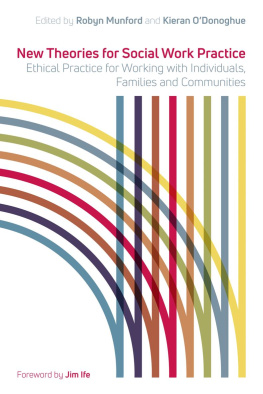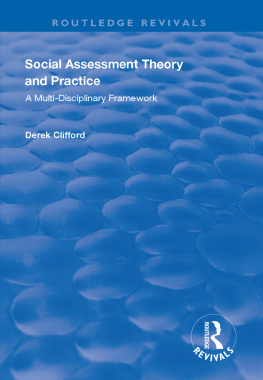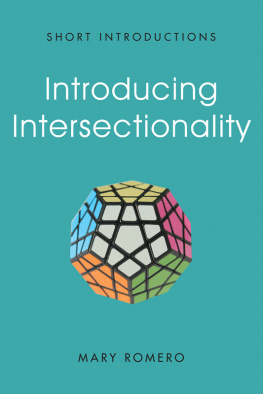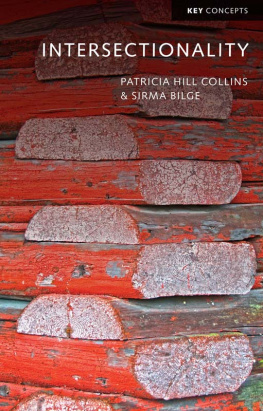
Intersectionality for Social Workers
This book explores how intersectionality theory can be applied to social work practice with children and families, older people and mental health service users, and used to engage with diversity and difference in social work education and research.
With case-study examples and practice questions throughout, the book provides a model for integrating intersectionality theory into social work practice. It highlights the ways intersectional theory helps us to understand the complexities of working with the interlocking nature of problematised elements such as gender, race, class, sexuality, disability, and other axes of structural inequalities experienced by groups in subjugated social locations. Intersectionality is used to examine multiple forms of inequalities and the complexities and questions they give rise to in social work practice. The emphasis throughout is that intersectional approaches can open up social work practice to new understandings of the complex linkages of multiple and intersecting systems of oppression that shape the lived experiences of diverse groups of service users.
Providing an introduction to an intersectional theoretical framework for understanding the lives and experiences of socially disadvantaged service users, Intersectionality for Social Workers will be required reading on all modules on anti-oppressive and anti-discriminatory practice, sociology, and ethics and values in social work.
Claudia Bernard is Professor of Social Work in the Department of Social, Therapeutic and Community Studies at Goldsmiths, University of London, UK.
First published 2022
by Routledge
2 Park Square, Milton Park, Abingdon, Oxon OX14 4RN
and by Routledge
605 Third Avenue, New York, NY 10158
Routledge is an imprint of the Taylor & Francis Group, an informa business
2022 Claudia Bernard
The right of Claudia Bernard to be identified as author of this work has been asserted by her in accordance with sections 77 and 78 of the Copyright, Designs and Patents Act 1988.
All rights reserved. No part of this book may be reprinted or reproduced or utilised in any form or by any electronic, mechanical, or other means, now known or hereafter invented, including photocopying and recording, or in any information storage or retrieval system, without permission in writing from the publishers.
Trademark notice: Product or corporate names may be trademarks or registered trademarks, and are used only for identification and explanation without intent to infringe.
British Library Cataloguing-in-Publication Data
A catalogue record for this book is available from the British Library
Library of Congress Cataloging-in-Publication Data
Names: Bernard, Claudia, author.
Title: Intersectionality for social workers : a practical introduction to theory and practice /
Claudia Bernard.
Description: New York, NY : Routledge, 2022. | Includes bibliographical references
and index.
Subjects: LCSH: Intersectionality (Sociology) | Social service.
Classification: LCC HM488.5 .B47 2022 (print) | LCC HM488.5 (ebook) | DDC 305dc23
LC record available at https://lccn.loc.gov/2021028752
LC ebook record available at https://lccn.loc.gov/2021028753
ISBN: 978-1-138-60719-4 (hbk)
ISBN: 978-1-138-60721-7 (pbk)
ISBN: 978-0-429-46728-8 (ebk)
DOI: 10.4324/9780429467288
Typeset in Helvetica
by Apex CoVantage, LLC
Contents
2 Intersectionality theory
3 Employing intersectionality in children and families social work
4 Intersectionality in mental health social work
5 Intersectionality and social work with older people
6 Intersectionality as pedagogical practice in social work education
7 Intersectional approaches and social work research
8 Concluding thoughts
- 2 Intersectionality theory
- 3 Employing intersectionality in children and families social work
- 4 Intersectionality in mental health social work
- 5 Intersectionality and social work with older people
- 6 Intersectionality as pedagogical practice in social work education
- 7 Intersectional approaches and social work research
- 8 Concluding thoughts
Guide
Acknowledgements
Writing this book would not have been possible without the support of a number of people. I owe a debt of gratitude to all the fantastic students, practitioners, and managers that I have dialogued with over the years, whose knowledge and ideas have enhanced my thinking and understanding about social work practice. Thanks also to my colleagues in the Department of Social, Therapeutic and Community Studies at Goldsmiths, for facilitating an environment conducive to my writing. I am appreciative of Sharon Jennings, Anna Fairtlough, and Joan Fletcher for providing thoughtful feedback on the chapter on social work education. A special word of thanks to Professor Frank Keating, Royal Holloway, University of London, for sharing some of his insights about mental health social work. I extend my appreciation to Carline Benoit, Michaela Dunn, Susan Hasler-Winter, and Carol Roberts who went out of their way to enable me to have access to practice examples and have been very supportive in sharing their knowledge about child and family social work. I want to thank my dear friends Khalida Khan and Jacqui Beckford for their enthusiasm, friendship, and encouragement throughout. Thanks as well to my dear sister, Heather Bernard, for her love and support. A very special thanks goes to my editor at Routledge, Clair Jarvis, for inviting me to write this book and for her commitment to the project; she has been very patient and supportive in working with me towards the books conclusion. I also must acknowledge the work of Catherine Jones for guiding the book through production. Finally, special thanks to my partner David Katz, for his love and support throughout the writing of this book.
Foreword
Covid-19 has shone a light on the many inequalities that scar our society. As we attempt to understand who has died and why, as well as the differences in living situations for so many others, we are obliged to reflect on the consequences of decades of policy choices that have left so many in such precarious situations, at the mercy of market forces that denied vulnerability and interdependence.
The writer and activist Rebecca Solnit notes that:
The first lesson a disaster teaches is that everything is connected At moments of immense change, we see with new clarity the systems political, economic, social, ecological in which we are immersed as they change around us. We see whats strong, whats weak, whats corrupt, what matters and what doesnt. I often think of these times as akin to a spring thaw: its as if the pack ice has broken up, the water starts flowing again and boats can move through places they could not during winter. The ice was the arrangement of power relations that we call the status quo it seems to be stable, and those who benefit from it often insist that its unchangeable. Then it changes fast and dramatically, and that can be exhilarating, terrifying, or both.
(Solnit, 2020, emphasis added, no page numbers)
The term intersectionality has spoken to attempts to understand how the interconnections operate and, crucially, reveal the power relations that characterise them. For example, how can we come to terms with and understand the following?






